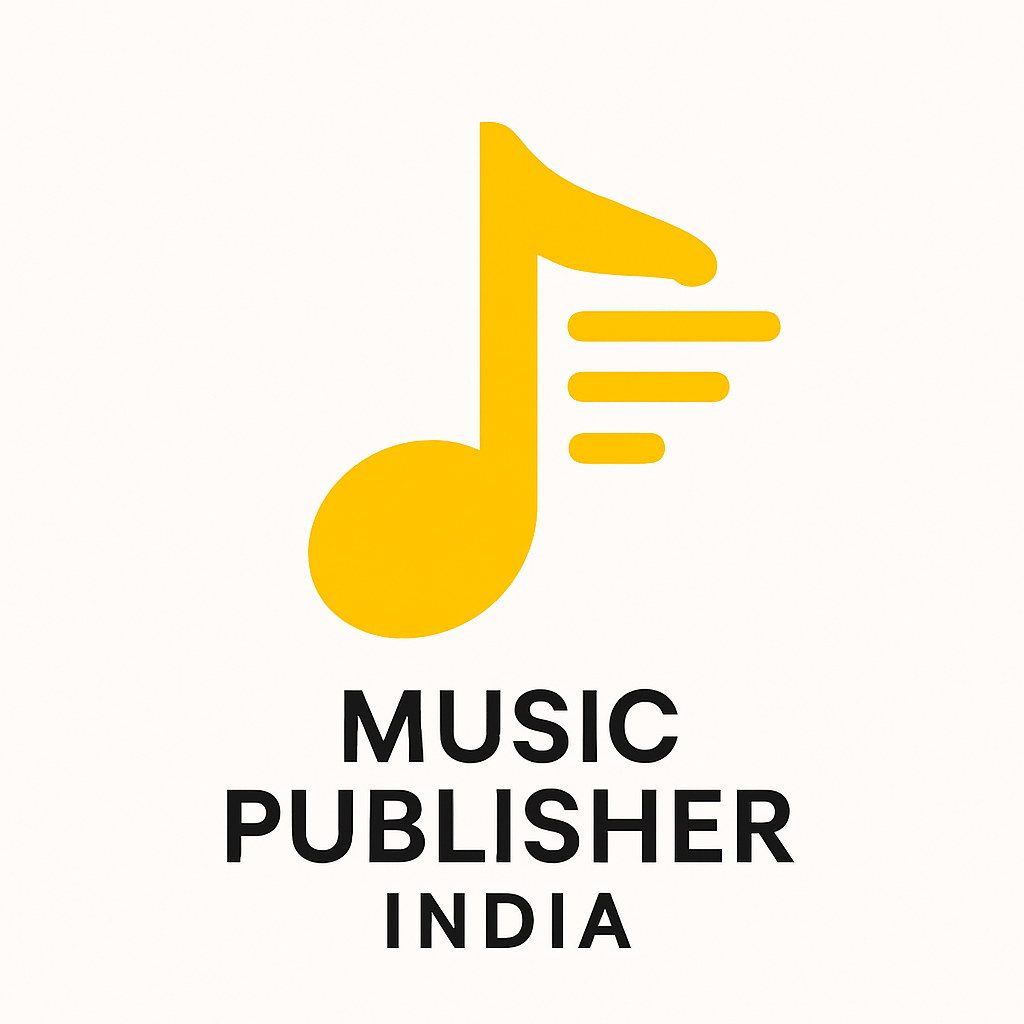
Why Music Publisher India Is the Best Music Distribution Company for Independent Artists in 2025
Music Industry | 20th June, 2025
New Delhi, June 20, 2025 – The Indian music industry has seen an explosion in independent talent over the last few years. But with growing talent comes the need for powerful distribution — and Music Publisher India has emerged as the top choice for indie musicians across the country.
With services tailored to independent artists, music labels, and regional creators, Music Publisher India is redefining how Indian talent reaches a global audience.
What Makes Music Publisher India the Best?
1. 250+ Global Streaming Platforms
Music Publisher India distributes your music to Spotify, Apple Music, JioSaavn, YouTube Music, Instagram, Facebook, Hungama, Gaana, Amazon Music, and more than 250 platforms. No matter where your audience is, your music reaches them.
2. 100% Artist-Focused Distribution
While many platforms prioritize major labels, Music Publisher India is built for independent artists. Whether you're a bedroom producer or a regional folk artist, they ensure your voice is heard.
3. Powerful Add-On Services (At No Extra Cost!)
Included with all plans:
- Spotify Playlist Pitching
- Caller Tune Setup (Airtel, Jio, Vi, BSNL)
- Instagram Profile Music Linking
- Official Artist Channel Setup on YouTube
- Catalog Optimization for Maximum Streams
4. Transparent Pricing – No Hidden Fees
Their pricing starts at just ₹1099, with a Premium Label Plan now discounted to ₹1999, allowing unlimited artists and unlimited songs under one label account — a game-changer for small and medium music companies.
SEO-Driven Distribution Strategy
What sets Music Publisher India apart is its search engine–friendly distribution strategy. They optimize your song titles, metadata, and playlist tags for search visibility, helping new fans find your music organically on streaming apps and Google Search.
Client Success Stories
From regional Bhojpuri singers gaining over 1M YouTube views to rap artists trending on Spotify India, Music Publisher India has delivered real results.
“I didn’t think it was possible to get my music on so many platforms so quickly. Within a week, I was live on Spotify, Instagram, and had my caller tune ready. Incredible service!”
— Aman Rai, Independent Singer-Songwriter from Lucknow
How to Start
Getting started is simple:
Visit www.musicpublisher.in
Choose a plan
Upload your tracks
Go live on 250+ platforms
Final Word
In a market filled with global aggregators and confusing royalty systems, Music Publisher India offers simplicity, scale, and support — all with a deep understanding of the Indian music ecosystem.
For any artist serious about growing globally while staying rooted locally, Music Publisher India is the #1 choice in 2025.
Stay Connected
- Website: www.musicpublisherindia.com
- Instagram: @musicpublisher.in
- Call Support:9754755602


Major Record Labels in Licensing Talks with Controversial AI Music Generators Suno and Udio
Music Industry | 11th June, 2025
In a move that signals a turning point in the ongoing tension between traditional music rights holders and emerging AI-powered music platforms, major record labels are reportedly in licensing discussions with controversial AI music generators Suno and Udio.
According to industry insiders, top music companies — including Universal Music Group, Sony Music, and Warner Music Group — are seeking to formalize agreements that would allow these AI platforms to use copyrighted material in their training and generation processes. The proposed deals reportedly include upfront licensing fees as well as a small equity stake in both Suno and Udio.
The AI Music Revolution Meets Legal Reality
Suno and Udio have made headlines in recent months for their ability to generate full-length, professional-quality songs using nothing more than text prompts. These platforms are widely praised for their innovation but have also drawn criticism and legal scrutiny over their data training practices. Critics argue that AI music models may have been trained on copyrighted recordings without proper permission — a claim both companies have declined to comment on directly.
As AI continues to redefine music creation, rights holders are now attempting to gain leverage through licensing frameworks. The reported deals are seen as an attempt to monetize AI usage rather than outright block it — a more pragmatic approach that acknowledges the unstoppable growth of generative technology.
Strategic Equity: A New Model for Coexistence?
Sources suggest that alongside licensing revenue, record labels are eyeing minor equity positions in both companies. This would not only allow the labels to profit from future success but also give them a say in ethical and commercial decisions moving forward.
This strategy mirrors similar deals made in the past, such as major labels investing in Spotify and receiving equity stakes as part of their distribution and licensing agreements.
A Delicate Balance
The talks come amid a broader legal and ethical debate over AI-generated content. Musicians, songwriters, and composers around the world have expressed concern about how their works are used in AI training, and whether AI-generated music could eventually replace human creativity.
By seeking licenses and equity, music companies appear to be betting on coexistence rather than confrontation — aiming to influence the development of AI platforms from within rather than fight them from the outside.
What’s Next?
Neither Suno nor Udio has issued a public statement regarding the licensing talks. However, if the negotiations are successful, it could set a precedent for how generative AI and traditional media rights can align, potentially paving the way for a new era of collaboration — or at least compromise — between Silicon Valley innovation and the legacy music industry.
As AI tools become more sophisticated and accessible, the music industry’s response will shape not just the future of creativity, but also the balance of power in the global entertainment economy.


What is a Music Distribution Service? A Look at Music Publisher India’s Role in Empowering Independent Artists
| 16th May, 2025
In the evolving world of digital music, one question frequently arises among aspiring artists: What is a music distribution service? Simply put, it is the bridge between musicians and music streaming platforms like Spotify, Apple Music, YouTube Music, JioSaavn, Amazon Music, and many more.
Music Publisher India, one of the fastest-growing digital music distribution companies in the country, is playing a crucial role in helping independent Indian artists get their music heard across the globe.
Understanding Music Distribution
A music distribution service ensures that an artist’s songs are delivered to multiple digital stores and streaming platforms. Instead of manually uploading music to each platform, artists can use a distributor like Music Publisher India to upload it once, and it’s automatically delivered to all major platforms. This allows artists to focus on creating while their distribution partner handles the technical, marketing, and royalty aspects.
Music Publisher India: A Complete Solution for Artists
Founded by Atul Singh, Music Publisher India has become a trusted name among musicians, especially those in regional, folk, devotional, indie-pop, and independent music scenes. The platform offers more than just song distribution—it provides a complete artist support system, including:
Spotify Playlist Pitching
Official Artist Channel (OAC) setup on YouTube
Caller Tune Setup on networks like Jio, Airtel, and Vi
Instagram and Facebook Profile Linking with official music
Catalog Optimization for better reach and visibility
This holistic approach has attracted a growing number of artists like Aarya Chakradhari, who specialize in Indian Pop, Folk, and Classical music. These artists now rely on Music Publisher India to ensure their music reaches global audiences with professional-grade support.
Why It Matters
With the shift to streaming, physical CDs and traditional radio are no longer the primary way people discover music. Today, a well-planned digital release is key to success. Music Publisher India empowers independent artists to monetize their music, gain exposure, and build a fanbase without needing a major record label.
A Platform for All Artists
Whether you’re a solo artist, music label, devotional singer, or band, Music Publisher India provides services tailored to your journey. From affordable pricing plans starting at just ₹1099 to dedicated support and analytics, the company is committed to transparent, artist-first distribution.
Final Thoughts
In a digital age where content is king, distribution is the gateway to discovery. With Music Publisher India leading the way, independent artists now have the tools and reach to make their voices heard—across India and the world.
Visit www.musicpublisher.in to learn more or begin your distribution journey today.
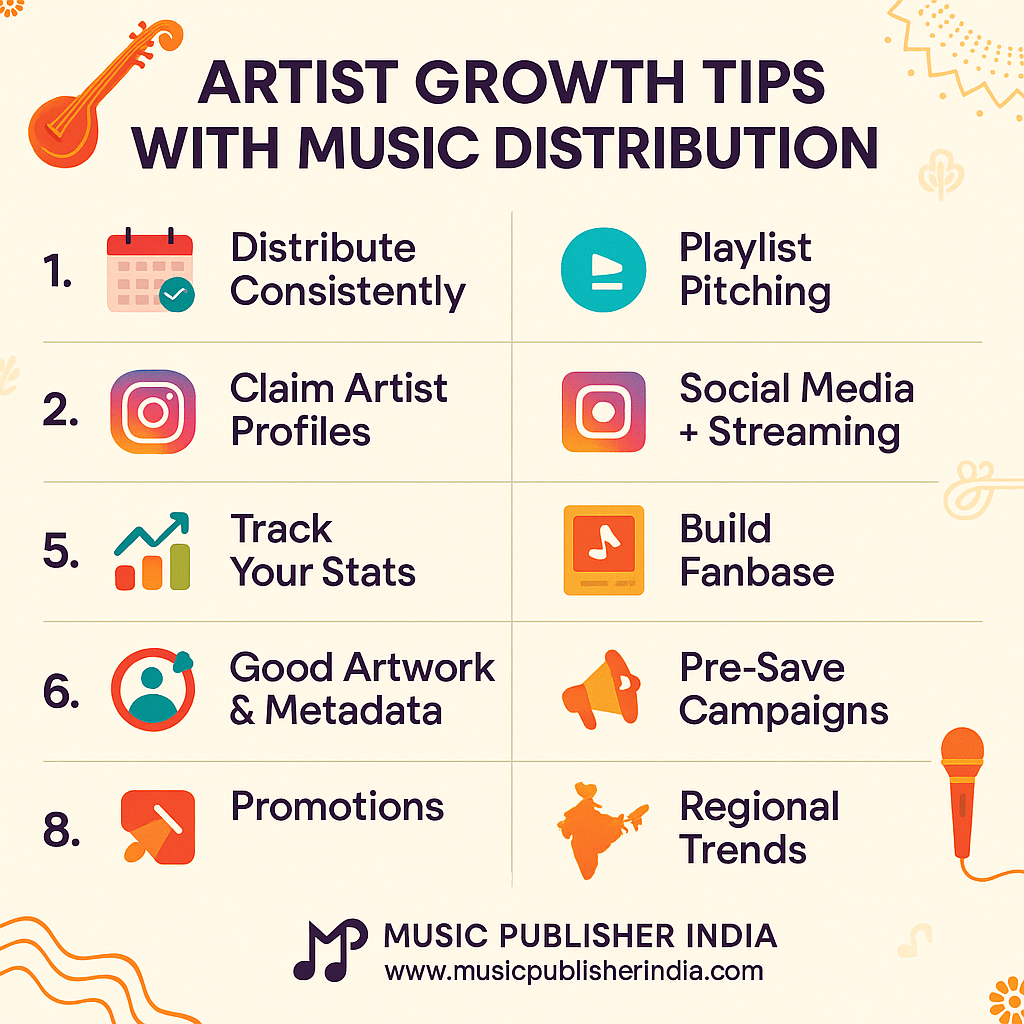
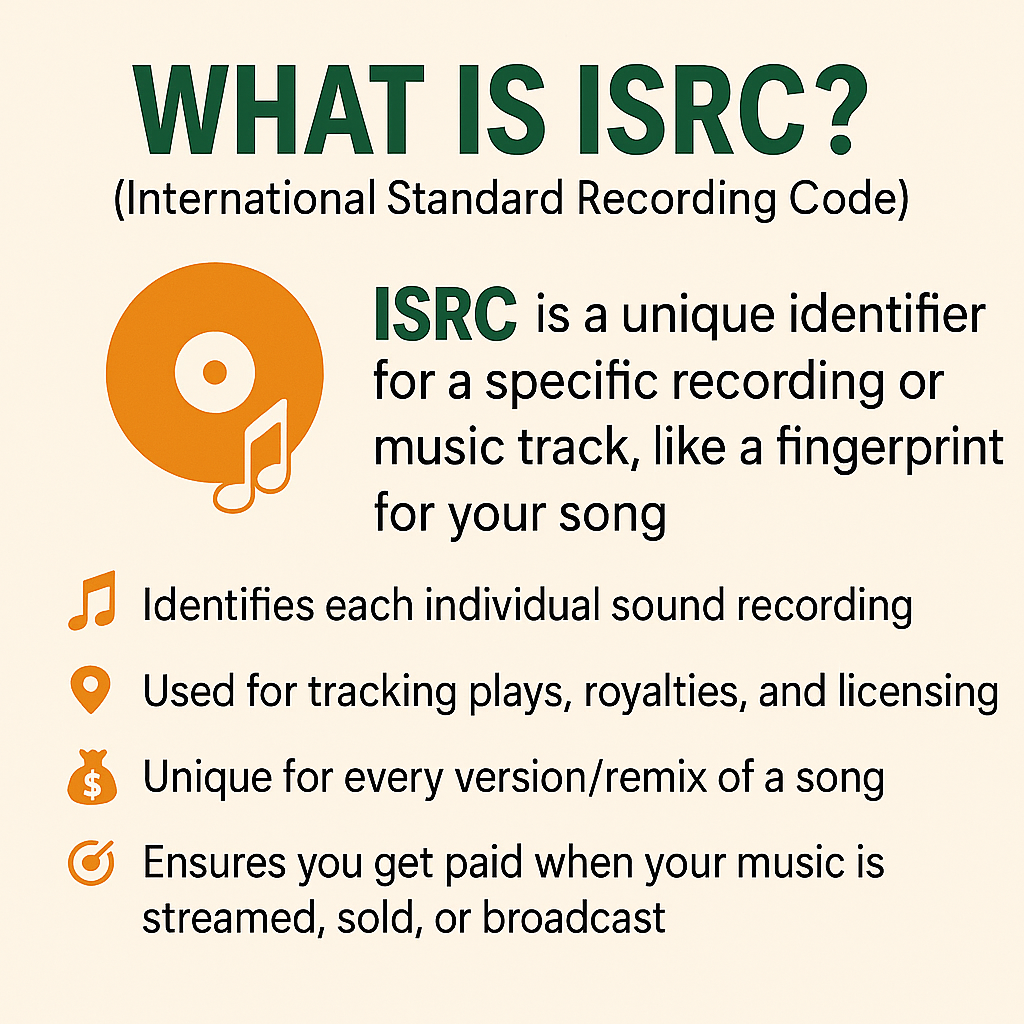
ISRC: The Invisible Code Powering the Global Music Industry
Music Industry | 9th May, 2025
By Music Publisher India News Desk
Published on May 9, 202
In today’s digital age, where billions of songs are streamed daily across platforms like Spotify, Apple Music, and YouTube, the question arises — how does the industry track each song, pay the right artist, and avoid mix-ups? The answer lies in four letters: ISRC.
What Is ISRC, and Why Should Every Artist Know About It?
ISRC stands for International Standard Recording Code — a 12-character alphanumeric code that serves as the digital DNA of a song or music video. Every time you record and distribute a track, an ISRC ensures your work is globally identifiable.
Unlike copyrights or publishing rights, which deal with ownership of lyrics and compositions, the ISRC is assigned to the actual recorded version of a track — not the written song. Even if you remix, remaster, or record a live version, each version must have its own unique ISRC.
The Structure of an ISRC
Here’s how the ISRC code is structured:
Copy
Edit
IN-ABC-25-00001
IN – Country code (India)
ABC – Code assigned to the label or independent artist
25 – Year of the recording’s registration
00001 – The unique identifier for that specific recording
It’s like the passport number of your song, allowing it to travel the world while being tracked for usage, royalties, and credits.
Why ISRC Is Critical for Indian Artists in 2025
With India's booming independent music scene and rising exports to global playlists, assigning ISRCs has become more crucial than ever. Here’s why:
Royalty Tracking: Without an ISRC, your song could be streamed a million times, and you might not receive a rupee.
Global Distribution: Digital stores and streaming platforms require ISRCs to catalog your music.
Protection Against Theft: ISRC acts as proof of your recorded work.
Analytics & Reporting: It allows platforms and distributors to send precise reports, showing which tracks are performing well.
Who Issues ISRC in India?
In India, ISRC codes are administered by the Indian Music Industry (IMI). Artists, labels, or distributors can register with IMI or work with a music distribution company like Music Publisher India to generate ISRCs automatically for each release.
"We handle ISRC creation for every track distributed through our platform. It’s part of ensuring our artists get the global recognition and revenue they deserve," says Atul Singh, founder of Music Publisher India.
Common Misconceptions
One ISRC for all my songs” – No. Each recording needs its own.
I don’t need an ISRC for YouTube” – Wrong. YouTube Content ID uses ISRCs for proper identification.
Only big labels use ISRCs” – Absolutely false. Every independent artist should have them.
Final Thoughts
The music industry is built on recognition, data, and rights. An ISRC bridges all three. Whether you're a newcomer releasing your first track or a seasoned artist building a catalog, assigning ISRCs is non-negotiable in the professional music world.
Need ISRCs for your songs?
Music Publisher India provides free ISRCs for all distributed tracks. Visit Musicpublisherindia.com or DM us on Instagram @musicpublisher.in to get started
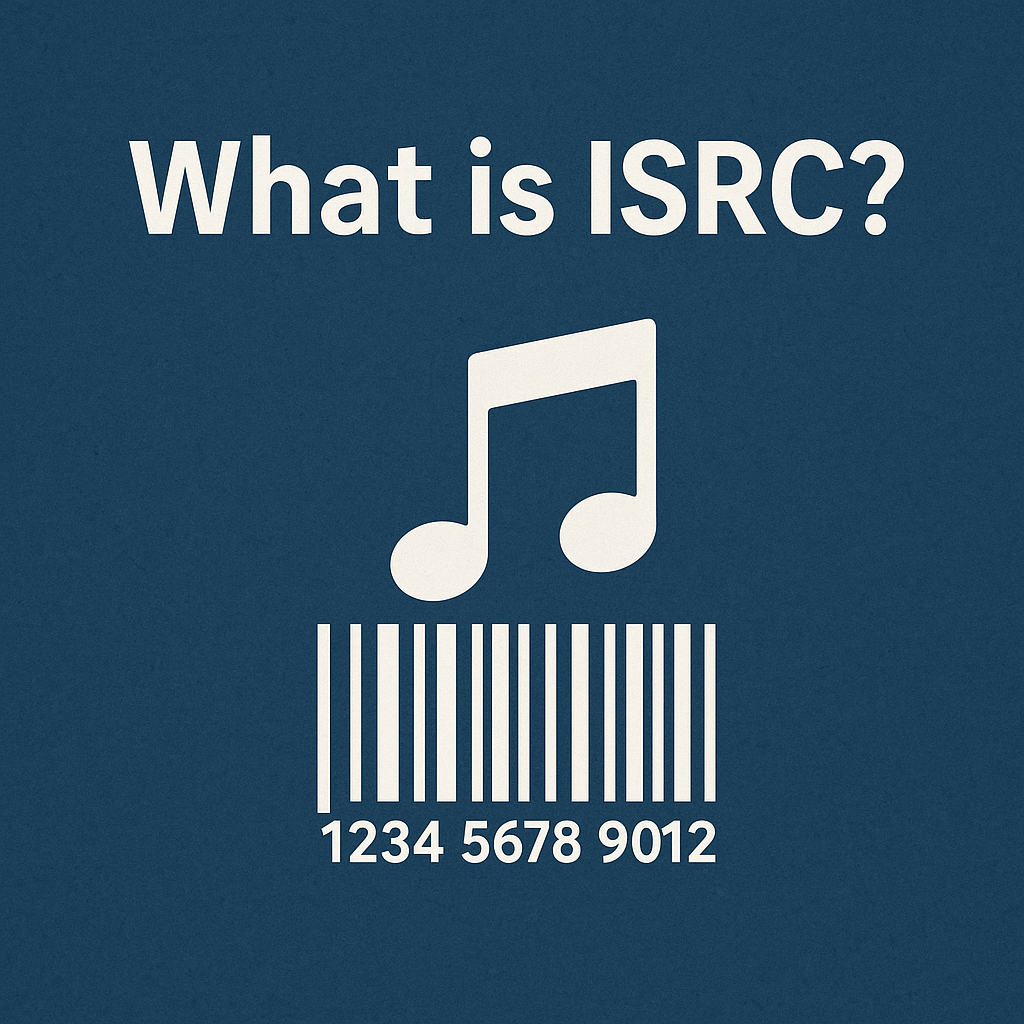
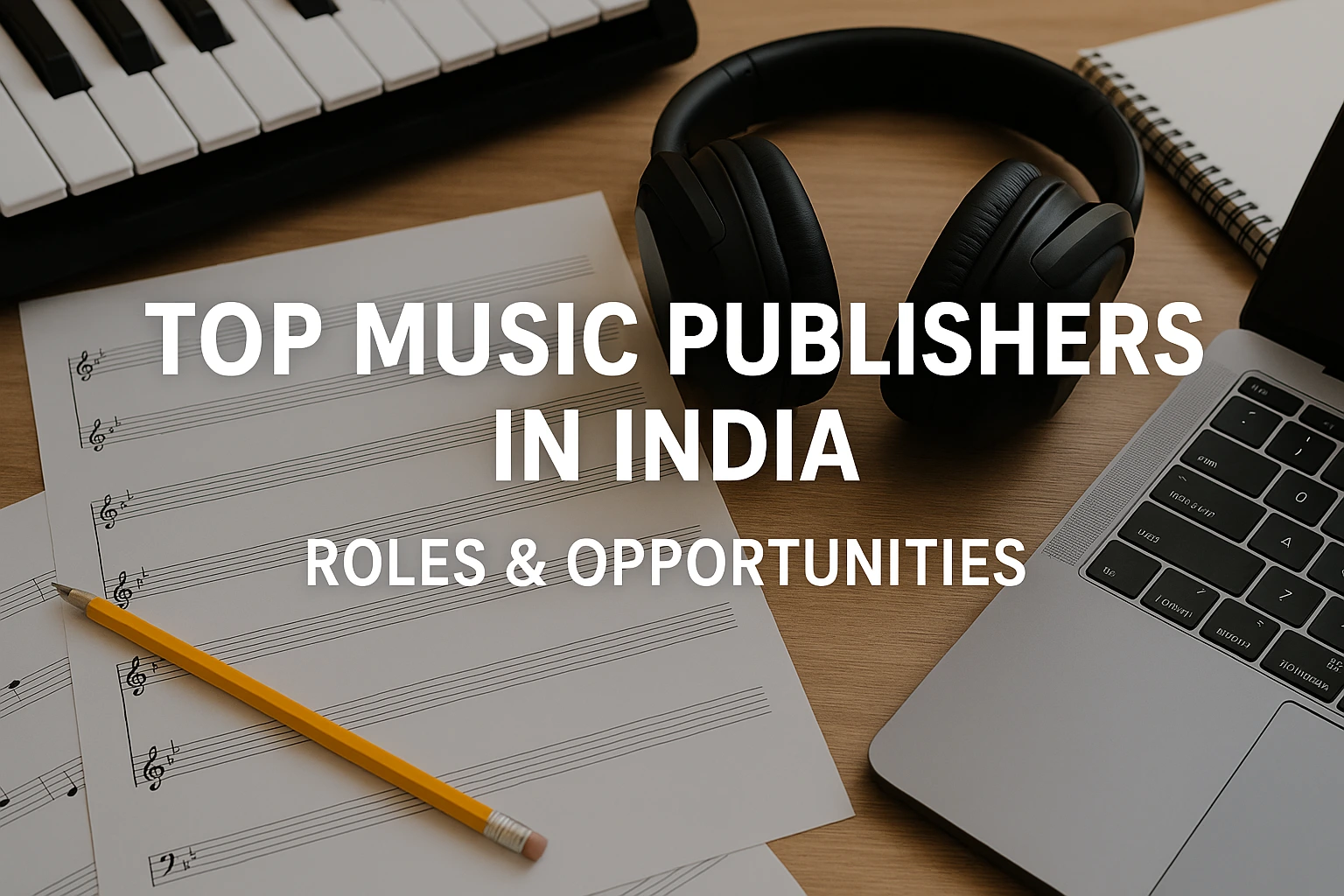
Guide to Music Publishers in India
Music Industry | 6th May, 2025
The Indian music industry has seen rapid growth in recent years, driven by digital streaming, independent artists, and film music. While music labels often get the spotlight, music publishers are the unsung heroes who ensure creators get paid and their rights are protected. In this blog, we explore the role of music publishers in India, key players in the market, and the opportunities they offer to composers, lyricists, and producers.
What is a Music Publisher?
A music publisher is a company or individual that helps songwriters and composers earn money when their music is used commercially. This includes:
-
Licensing songs for films, TV, ads, and streaming
-
Collecting royalties from various platforms
-
Protecting copyright and ensuring legal use
-
Promoting songs to potential buyers or licensees
Publishers often act as business partners to artists, managing their musical works and ensuring long-term monetization.
Types of Music Royalties in India
To understand the value of music publishers, it's essential to know the kinds of royalties they manage:
-
Mechanical Royalties – Earned when music is sold, downloaded, or streamed.
-
Performance Royalties – Earned when music is played on radio, TV, live performances, etc.
-
Synchronization (Sync) Royalties – When music is used in films, ads, or games.
-
Print Royalties – From sheet music and lyrics publications.
Why Artists Need Music Publishers
Many independent artists, composers, and lyricists struggle with tracking royalties across multiple platforms. A publisher simplifies this by:
-
Registering the work with Performing Rights Organizations (PROs) like IPRS
-
Handling licensing deals and contracts
-
Fighting piracy and copyright infringement
-
Building connections with music supervisors and content creators
Music publishers are particularly helpful in India, where the market is complex and involves multiple languages, media formats, and legal regulations.
Top Music Publishers in India
India has both international and homegrown music publishers working across Bollywood, regional, and independent sectors.
1. T-Series Publishing
One of the largest music labels in India, T-Series also operates a publishing arm. They manage massive Bollywood catalogs and dominate YouTube streaming. T-Series owns rights to songs across multiple languages and platforms, often working directly with composers and lyricists.
2. Sony Music Publishing India
An Indian division of the global giant, Sony Music Publishing works with established and emerging talent. They handle sync licensing, royalty collection, and artist promotion, making them a trusted partner for many independent artists and film composers.
3. Saregama Publishing (RP Sanjiv Goenka Group)
Saregama holds the rights to thousands of classic songs from the golden era of Indian cinema. They are known for licensing old hits for movies, series, and ads. Their catalog is a goldmine for sync opportunities.
4. Times Music Publishing
Part of the Times Group, Times Music represents a wide variety of genres — devotional, indie, Bollywood, and regional. They also offer sync services and have partnered with global firms to distribute and monetize Indian music worldwide.
5. Zee Music Company
Zee Music has grown rapidly by associating with regional films and Bollywood projects. While primarily a label, they also work closely with publishers and composers to manage rights and royalties efficiently.
6. TuneCore India / Believe Music
TuneCore provides music distribution and publishing services for independent artists. Their publishing division helps musicians register songs, collect international royalties, and license music for sync deals.
7. Tips Industries Ltd.
Known for Bollywood hits from the 1990s and 2000s, Tips Music has a strong publishing division. They manage rights across multiple platforms and are active in licensing for OTT, films, and global distribution.
How to Sign with a Music Publisher in India
If you're an artist, composer, or lyricist, here's how you can approach a music publisher:
-
Build a Catalog: Publishers look for artists with original, high-quality music.
-
Get Your Works Registered: Register with IPRS or other collection societies.
-
Approach Relevant Publishers: Choose publishers that specialize in your genre or language.
-
Submit a Demo: Prepare a professional portfolio with links to your music, lyrics, and previous work.
-
Read Contracts Carefully: Understand revenue splits, ownership clauses, and licensing terms.
Benefits of Music Publishing for Independent Artists
-
Royalty Tracking: Publishers track plays on Spotify, YouTube, radio, TV, and OTT platforms.
-
Global Reach: With publishers like Sony or TuneCore, your music can earn internationally.
-
Legal Protection: Infringement is common; publishers help you protect your copyright.
-
Sync Licensing Opportunities: Many artists earn big through music placements in ads, films, or web series.
-
Career Support: Publishers often help you co-write, collaborate, or promote your music.
Challenges in the Indian Music Publishing Industry
Despite the growth, challenges remain:
-
Lack of awareness among indie artists about publishing rights
-
Unorganized sector with limited transparency
-
Piracy and unauthorized use of songs
-
Language and regional diversity, making standardization difficult
However, reforms by IPRS and newer digital-first platforms are improving the ecosystem.
Future of Music Publishing in India
India’s music publishing landscape is evolving with:
-
Increased digital royalty collections
-
OTT boom driving sync licensing demand
-
Global collaborations with artists and labels
-
Use of AI and blockchain for royalty tracking and copyright management
With the rise of non-film music, publishers now have a broader role in shaping artist careers beyond Bollywood.
Conclusion
Music publishers in India are becoming increasingly essential for anyone involved in music creation. Whether you're a seasoned Bollywood composer or a bedroom indie artist, partnering with a good publisher can significantly boost your earnings, protect your rights, and open up new revenue streams.
As the Indian music industry goes global, now is the right time to understand and leverage music publishing for long-term success.
